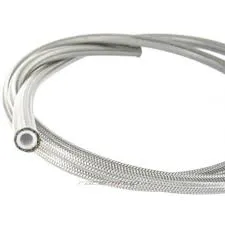अगस्त . 01, 2024 03:22 Back to list
Helical Metal Hose Exporters and Their CE Certification Requirements for International Trade
CE Certification for Helical Metal Hose Exporters Ensuring Quality and Compliance
In the global marketplace, exporters often face the challenge of meeting various regulatory standards to ensure the safety, quality, and reliability of their products. One such standard is the CE (Conformité Européenne) marking, which signifies that a product complies with European Union (EU) legislation. For exporters dealing with helical metal hoses, achieving CE certification is not merely a bureaucratic hurdle but a vital step toward expanding their business in the EU market.
Understanding Helical Metal Hoses
Helical metal hoses are flexible tubes made of metal, designed to withstand high pressures, temperatures, and corrosive environments. They are widely used in various industries, including oil and gas, chemical processing, food and beverage, and aerospace, due to their durability and flexibility. However, the specific design and operational conditions of these hoses necessitate rigorous standards to ensure safety and performance.
The Importance of CE Certification
CE certification serves multiple purposes. First and foremost, it reassures customers that the product meets essential health, safety, and environmental protection requirements set by the EU. This is particularly important for helical metal hoses, as they often operate in demanding environments where any failure could lead to catastrophic consequences.
Furthermore, CE marking enhances market acceptance. In the EU, products without a CE mark may be prohibited from sale or face significant barriers to entry. By obtaining CE certification, exporters can position their helical metal hoses more competitively within the EU market, attracting a wider customer base and potentially increasing sales.
The CE Certification Process
The path to CE certification for helical metal hoses involves several steps. Initially, exporters must conduct a thorough analysis of applicable EU directives and standards relevant to their products. Common directives for hoses may include the Pressure Equipment Directive (PED) and the Machinery Directive, among others.
ce certification helical metal hose exporters

After identifying the applicable standards, the exporter must ensure compliance through proper design, testing, and documentation. This process often involves
1. Design Review Evaluating the design of the metal hose to ensure it meets the necessary specifications and safety requirements. 2. Testing Conducting tests to assess the performance of the hoses under various conditions. This may include pressure testing, flexibility testing, and resistance testing against corrosive substances.
3. Documentation Maintaining a detailed technical file that includes design documentation, test results, and risk assessments. This file is crucial for demonstrating compliance during audits or inspections.
4. Declaration of Conformity Upon successful testing and verification of compliance, the exporter must prepare a declaration of conformity, stating that the product meets all relevant EU directives.
5. Affixing the CE Marking Finally, the CE mark can be affixed to the product, indicating that it complies with EU regulations.
Benefits Beyond Compliance
Beyond just regulatory compliance, obtaining CE certification can lead to improved product quality and customer satisfaction. The process of preparing for certification often requires exporters to enhance their operational processes, leading to better quality control and assurance. Additionally, the trust garnered through CE marking can foster long-term relationships with clients, who may prefer to work with exporters that prioritize safety and quality.
Conclusion
For helical metal hose exporters, CE certification is more than just a regulatory requirement; it is a gateway to accessing the European market and building credibility with customers. By undergoing the certification process and adhering to stringent quality standards, exporters can enhance their reputation, ensure product safety, and ultimately achieve business growth in an increasingly competitive landscape. As global demand for high-quality and reliable products continues to grow, embracing CE certification is a strategic move that no exporter can afford to overlook.
-
Best Four Steel Wire Spiral Hose Hydraulic R12 – Durable High-Pressure Hose Manufacturer
NewsJul.08,2025
-
High-Quality 1/4 Hydraulic Hose – Soft, Flexible & Durable Rubber Hoses for Industrial Use
NewsJul.08,2025
-
1 1 2 Inch Hydraulic Flexible Hose - Durable, Reliable, High-Pressure Solutions
NewsJul.07,2025
-
High-Quality 1 2 Rubber Hose - Durable, Flexible Hydraulic Solutions
NewsJul.07,2025
-
Discover SAE Hydraulic Hose Types - High Quality & Durable Hoses from Leading Factory Supplier
NewsJul.06,2025
-
High Pressure Wire Hydraulic Rubber Hose Supplier Durable & Reliable 1SN Hose Solutions
NewsJul.06,2025
